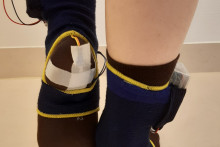The idea behind the vibrating socks comes from another UT alumnus, Carola Koopman. As Parkinson’s disease progresses, many patients develop difficulties walking. ‘Freezing’ is a common problem: suddenly the patient is unable to continue walking. Sometimes cueing helps: matching one’s steps to an external signal such as the tapping of a metronome or the light of a laser light. But it can be rather inconvenient to carry around such artefacts: a Parkinson-patient got kicked out of a bus for his laser light equipped shoes. An invisible cue, such as a vibrating socks, would be a better solution. The first tests showed good results.
Sensors and videos
After eight people participating in the first tests, the follow-up study is now expanding to 40 patients. The first twenty already applied; a call has been placed for the remaining twenty. ‘We are specifically looking for Parkinson's disease patients who suffer from freezing several times a day,’ Klaver explains. She aims to have finished measuring the walking patterns of all test subjects, with and without vibrating socks, by the end of this year. The research initially takes place at the test environment, but will later expand into the homes of the participating patients.
Making a difference
This follow-up study is to gain more insights in the effectiveness of the socks.
Klaver is hopeful: 'Certain patients seem to benefit greatly from the socks. The aim is to develop a product that people with Parkinson’s disease can use on a daily basis. For them, it can make the difference between being afraid to 'freeze' in the middle of the street, or not. The socks need further development, but I certainly see a future for this product.'
funded by michael j. fox foundation
The Michael J. Fox Foundation donates 200.00 euros to the follow-up research on the vibrating socks. It was founded by the American actor Michael J. Fox, known from the film trilogy Back to the Future, who was diagnosed with Parkinson's at the age of 29. It took him years to ‘come out of the closet’ with that diagnose. In 2000 he founded the Michael J. Fox Foundation, which so far invested more than 900 million dollars in research projects. It’s motto: Here. Until Parkinson's isn't.






